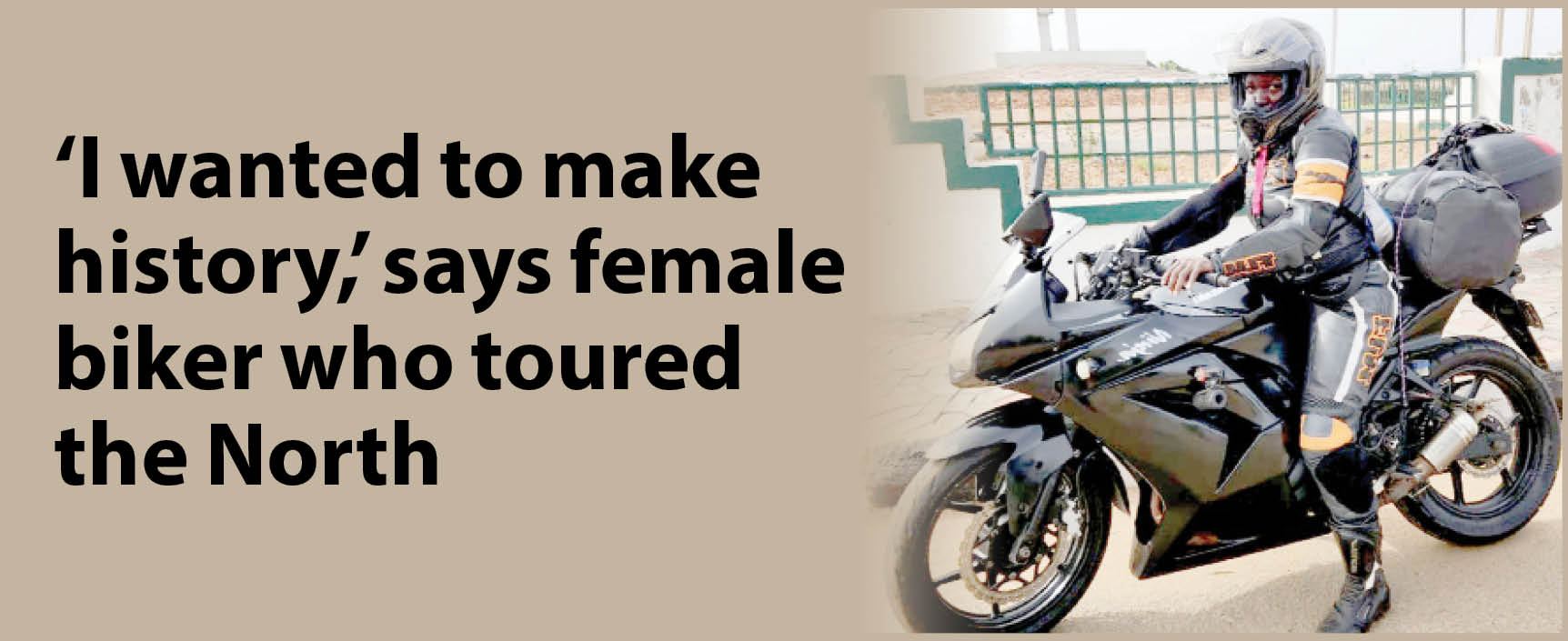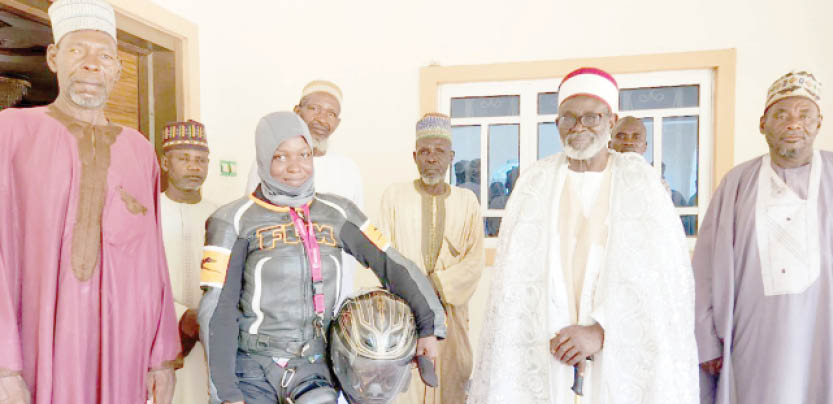‘I wanted to make history,’ says female biker who toured the North
Twenty-nine-year-old Babatunde Hafsoh Olayemi is a biker, fashion designer who works with the Nigerian Immigration Service (NIS), Ogun Command. She holds a First Degree in Islamic Education, University of Ibadan and a Master’s Degree in Educational Administrative and Planning, National Open University. Olayemi recently had a tour riding across all the 19 northern states of […]

Babatunde Hafsoh Olayemi
Twenty-nine-year-old Babatunde Hafsoh Olayemi is a biker, fashion designer who works with the Nigerian Immigration Service (NIS), Ogun Command. She holds a First Degree in Islamic Education, University of Ibadan and a Master’s Degree in Educational Administrative and Planning, National Open University. Olayemi recently had a tour riding across all the 19 northern states of Nigeria covering over 5,000 kilometres. She shares her experience in this interview.
How did you start your biking career?
I started biking last September, I’m less than a year old. My reason for biking was that I felt the bike is cheaper and it is easy to manage but when I joined, it was a different thing alltogether. But I’m grateful I joined.
I went to training school in Lagos and I also have some friends who were able to educate me on biking from when I started. I trained for four weeks. I trained on weekends because of the nature of my job. Recently, I did a tour round the northern part of Nigeria. I have been able to travel the whole Nigeria, even outside Nigeria. I have been to Togo, Cotonou and Cameroon in less than a year.
What inspired your tour to the north?
I love to explore; I love to see things my own way. The reason why I travelled to the northern parts of the country was because I have friends who live there and they come here and people say the North is not safe and you can’t go there, but that propelled me more to want to go and see things for myself. I went as far as Sokoto, Maiduguri and the people there were not as bad as I was told, they were really accommodating.
- PHOTOS: Gov Adeleke joins devotees at Osun Oshogbo festival amid jubilation
- Gombe ranked 6th on BudgiT’s 2023 Fiscal Transparency Report

How were you able to cover the entire states?
I started the journey on 4th of June and I ended it two weeks later. I started from Abeokuta; I headed to Akure from Akure to Kaba, from Kaba to Lokoja, from Lokoja to Abuja, from Abuja to Nasarawa and then to Benue State. I headed to Jos, Plateau, to Bauchi from Bauchi to Gombe, to Adamawa, and to Jalingo in Taraba State.
Niger crisis: Nigeria, Benin, Ivory Coast, Senegal commit troops as AU backs ECOWAS
Ministers: How power play, gang-up forced El-Rufai out
I had a nasty experience in Gombe. On my way out of the reception one morning, I had this disaster. A car hit me and I lost a lot of things. It took me three days to fix my bike and since that time, the bike has not got its balance. I was destabilized to the extent that people around me started saying ‘maybe you should take the bike back home because you already lost this.’ That made me feel hurt. More than what happened to me, people told me what hurt me the more. They were like “who do you want to impress? Just go back home.” That hurt me and when I got to my hotel room, I cried. They were bikers who were meant to encourage me not to give up.
But one handsome man, Mr Wale, who just rode from London down to Abeokuta, told me ‘as long as my bike engine is still working, I should not stop.’ I think that really motivated me.
Then, I went to Yobe State, where I met with the Emir of Pataskum, Alhaji Umaru Bubaram Ibn Wuriwa Bauya I, OON, who treated me to a rousing welcome. I slept at the palace.
From Yobe, I headed to Borno State. From Borno I went back to the Emir of Pataskum’s palace to pass a night. The Emir gave me two history books. One titled ‘Hard Facts on Pataskum Emirate of Yobe State, Nigeria,” and the second one “The Chronology and Biography of Pataskum (Potiskum) Emirate.”
From the Emir’s palace, I headed to Jigawa and then Kano. I slept in Kano where I was hosted by bikers. From Kano to Katsina, where I visited former President Muhammadu Buhari’s hometown, Daura. I slept in Katsina where I was also welcomed by bikers. From Katsina, I headed to Zamfara, I also met bikers, they were nice people. I left there for Sokoto. They took me to the Sultan’s palace. I slept in Sokoto and the next day, I headed to Kebbi. I was told that I happen to be the first female biker on the Sokoto-Shagari-Aleiro-Jega road.
With my arrival in Kebbi, I have been able to cover 85 percent of my trip. From Birnin Kebbi to Zaria, then Kaduna. Then, I headed to Niger State, where I slept in Minna. From Minna, I went down to Kwara.
Kwara was the last place of my tour of the 19 northern states. By the time I took a picture of ‘welcome or farewell to Kwara’, I felt fulfilled. I felt happy to do what felt like a nightmare. At that moment, I was teary because I could not believe that with the breakdowns, obstacles in between or before, I could accomplish that. That tells me that you don’t stop when you see challenges, you don’t give up, you believe in yourself and keep pushing, especially when you see that what you want to do is achievable, don’t give up.
From Kogi to Kwara, the mileage was 5,356 kilometres. So, covering the whole states – from Abeokuta through the 19 northern states and back to Abeokuta, is 5,920 kilometres.
What were your most challenging moments on the trip?
I had two most challenging moments. When I went to Taraba, on my way to Jalingo, I passed through a route which is called Numan Road towards getting to Jalingo. The road was lonely and then I started remembering everything people told me about the North. That road was not safe, but I was not aware of it because on my map, it was a little bit shorter and when I checked the other route, I should have passed was longer and it was not well routed, so I passed that shorter route and it was more than 120km, but the only town I passed through was one or two and I was an off road and was so scared. In fact, by the time I got to the town, the people that saw me were surprised, they asked how I survived, they said it is a lonely road, but thank God I was able to do it. People always welcome me, especially children.
Another scary moment was my encounter with two men around Jigawa, heading to Kano. The two men came to where I had a stopover to take water, one holding a gun and the other a cutlass. They were both facing me. I was worried and scared. I don’t understand their language. I had to call the Prince of Pataskum’s. He said if I had any challenge, I should call him. I called and explained the situation. He asked me to hand over the phone to one of them. I was scared but I was able to do that. They told him that they were fighting about something and I came in between them. I said I didn’t know what they were talking about. I guessed he was able to talk to them. He just asked me to start my bike and move away immediately. I had to race from the spot without riding. From that spot, I did not even pause until I got to Kano.
What are the other challenges in the cause of the trip?
I fell sick twice. First time it was in Jos. I felt maybe it was due to the environment. I was exposed to much cold. I was given some drugs by friends who I met there and I recovered quickly.
That particular morning you set out on the trip, what was going through your mind? Were you sure you were going to make it back alive?
I was not sure because when I woke up that morning, I was feeling feverish. I missed my route twice. That was enough to make me turn back, but I would rather die making history than die for no benefits.
There is nowhere that is truly safe, but if we can make do with safety precautions, we can be safe. I embarked on the journey with the notion that the north is not safe, but I was able to do it with the help of friends, family and people around. The truth is it is risky and I know, but I was able to take some precautions like not riding at night, I was able to map my route well and I was able to get information from residents of those communities. So, I know the moment to ride and not to.
I was exposed. I was able to acquire more knowledge. I was able to meet good people, learn culture and see things for myself, and now I can tell you categorically that the north is not what we picture here in the south or the west. I am a living witness that the north is safe and I was able to make the trip with the help of people and safety precautions.
How were you able to convince your parents about embarking on the tour?
When I told my parents I wanted to travel, they were not really happy about it because they felt it was not safe, but I assured them I will be safe and we all prayed and talked about it. When I started the journey, I was always calling them to give them updates, even on the trip, once I felt it was more than two, three hours, I called them and they also called to check up on me.
What’s the cost of your trip to the north?
My trip to the North cost me more than N1million, I can’t say the exact amount, but it was more than a million naira and I was able to raise the money myself because when I started the whole planning and everything, people were like who will venture into this thing, but I wish people can see beyond that.
It was an expensive trip but I don’t regret venturing into it because I enjoyed every bit of it, I’m glad I did it alone without a sponsor. I am also glad I made history as the first female biker to embark on such a trip in Nigeria.
How do you combine your official duty and riding a bike?
I embark on my trips whenever I’m on work leave. I cannot leave the office without taking permission. My last trip too was during my leave. I embarked on the Cotonou trip on a weekend. I left on Friday and came back Sunday evening.
When is your next trip and any plans to go to Europe?
My next trip should be Senegal, hopefully I get to go to Europe. I should be able to get to Europe because this my last trip was equivalent to me getting to Europe because the whole trip was 5,920km which covers averagely the whole of West Africa.
